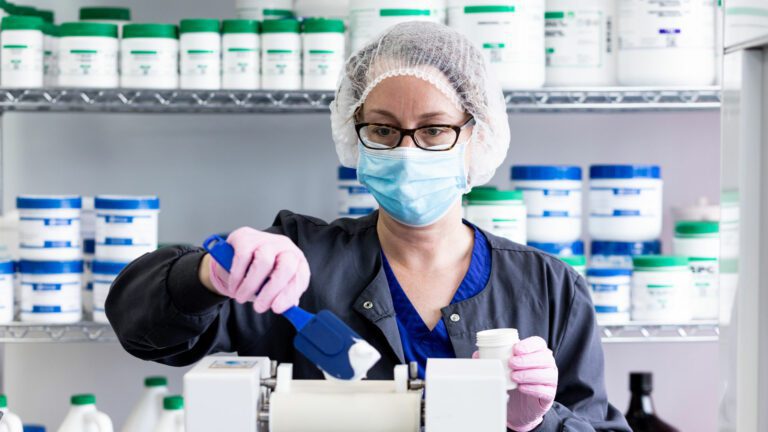
The standards referenced in the article below are out of date as of February 1, 2025. Please refer to ACP’s new standards for up-to-date information.
Increasingly, ACP pharmacy practice consultants have noticed that some pharmacy teams who believe they are compounding drugs are, in fact, manufacturing. Manufacturing is not permitted under the Food and Drugs Act and the Food and Drugs Regulations unless an establishment license has been authorized and issued by Health Canada.
Health Canada provides the following definition of compounding:
“The combining or mixing together of two or more ingredients (of which at least one is a drug or pharmacologically active component) to create a final product in an appropriate form for dosing. It can involve raw materials or the alteration of the form and strength of commercially available products. It can include reformulation to allow for a novel drug delivery. Compounding does not include mixing, reconstituting, or any other manipulation that is performed in accordance with the directions for use on an approved drug’s labelling material.”1
It is important to note that pharmacy professionals who prepare compounded products for patients must be able to demonstrate that a patient-healthcare professional relationship exists. This means that in performing compounding, a regulated member must have a professional relationship with the patient. In other words, the compound and the service are specific to an individual who is a patient of the pharmacy professional.
In addition, compounding should only be done if there is a therapeutic need or lack of product availability and should not be done solely for economic gain by healthcare professionals.2 Pharmacies that do not provide certain compounding services may contract those services from another pharmacy that does.3
The Pharmacy and Drug Act requires that a pharmacy holding a compounding and repackaging licence enters into a compounding and repackaging agreement approved by Council with each licensed community pharmacy to which it provides compounded and repackaged drugs.
The following practices describe manufacturing and are not permitted through the compounding authority held by pharmacists and pharmacy technicians:
- Providing compounding services if the pharmacy cannot demonstrate that a patient-healthcare professional relationship exists.
- Producing an identical product that is already commercially available, unless there is a shortage of the commercial product.
- Producing or selling the product to a third party (e.g., medical clinics, veterinary clinics) for the purpose of resale (described below).
- Producing products intended for distribution or sale outside the demonstrated patient-healthcare professional relationship.
- Producing products in a scale, time, and frequency to fall outside of a patient-healthcare professional relationship.
- Producing a drug product that requires only minor modification prior to direct administration when such modification amounts to mere directions for use. Examples of such include the addition of liquid to a powder or adding a powder to animal drinking water. Compounding does not include mixing, reconstituting, or any other manipulation that is performed in accordance with the directions for use on an approved drug’s labelling material (Aside added: “within the normal practice of pharmacy”).
- Repackaging commercially available drugs in a finished dosage form outside the normal dispensing activities within the practice of pharmacy.4
In the absence of a patient-specific prescription, and with a prescriber’s order for office use, compounders may prepare a compounded product in a quantity, time, or frequency to ensure it is being used within a patient-healthcare professional relationship. However, compounded products may not be provided for the purposes of re-sale by the clinic. This means that the compounds are for use and administration within the office by the practitioner. They will be infrequent and for small quantities of drug.
It is not appropriate for pharmacists to provide drugs or compounds “for office use” in large quantities, or in bulk for the purpose of redistribution, as that is manufacturing. Further, it is prohibited for a pharmacy to sell compounded preparations to a second pharmacy for the purpose of resale to a third pharmacy. Compounds must only be sold between pharmacies pursuant to a patient-specific prescription or in limited quantities in reasonable anticipation of a patient-specific prescription.
All pharmacies in Alberta must comply with ACP’s non-sterile and sterile compounding standards. For more information about the standards, including guidance, the “getting started” document, compounding essentials, FAQs, and templates, visit the non-sterile compounding page and sterile compounding page of the ACP website.
- https://www.canada.ca/en/health-canada/services/drugs-health-products/compliance-enforcement/good-manufacturing-practices/guidance-documents/policy-manufacturing-compounding-drug-products.html. Accessed November 23, 2020. ↩︎
- https://www.canada.ca/en/health-canada/services/drugs-health-products/compliance-enforcement/good-manufacturing-practices/guidance-documents/policy-manufacturing-compounding-drug-products.html. Accessed December 20, 2021. ↩︎
- https://www.canada.ca/en/health-canada/services/drugs-health-products/compliance-enforcement/good-manufacturing-practices/guidance-documents/policy-manufacturing-compounding-drug-products.html. Accessed December 20, 2021. ↩︎
- https://www.canada.ca/en/health-canada/services/drugs-health-products/compliance-enforcement/good-manufacturing-practices/guidance-documents/policy-manufacturing-compounding-drug-products.html. Accessed December 20, 2021. ↩︎




